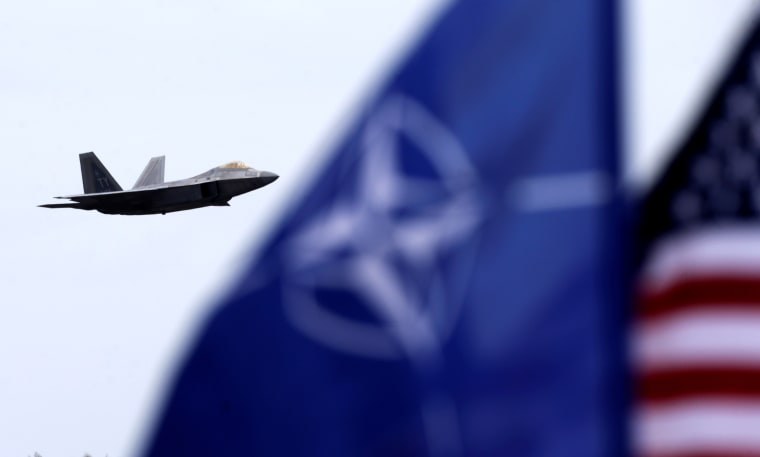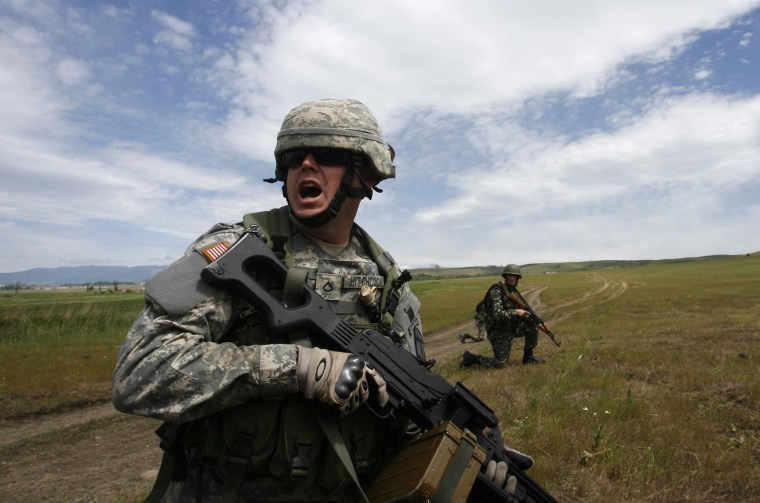If Donald Trump actually follows through on his bold rhetoric he is in danger of tearing NATO apart, and with it the very concept of "the West" itself, according to experts.
During his campaign, Trump sent shock waves of alarm through Europe after revealing that he might not come to the aid of his NATO allies if they were attacked.
"A world without NATO would be the unraveling of the West"
This called into question a fundamental principle of the alliance: that an attack against one of its 28 members is considered an attack against all.
Furthermore, the president-elect has cozied up to Russian President Vladimir Putin, a strongman who's positioned himself as NATO's arch-antagonist.
All this could have mortal consequences for a Euro-American alliance funded by billions of U.S. dollars over its 67-year history.
If a NATO member was attacked by Russia and Washington didn't come to its aid, then "it's finished — that’s completely the end of NATO," according to Judy Dempsey, a nonresident senior associate at the Carnegie Endowment for International Peace.
That's because of something called Article 5 of the Washington Treaty, the core principle of NATO that says members should mount a collective defense against attackers.
"If it becomes clear that the U.S. will not honor Article 5 commitments, or enough members believe that they won’t, then there’s a possibility to total disintegration," said Tate Nurkin, a defense analyst at global consultancy IHS.
Related: Trump Inherits an Increasingly Divided World
The only country to invoke this part of the treaty was the U.S. itself after the 9/11 attacks.
Its wording doesn't say military force must be used, only that each country should take "action as it deems necessary, including the use of armed force." But in reality, smaller members expect that the U.S. would come to their aid.
How likely is a conflict, anyway?
Although Russia doesn't appear to be on the brink of all-out war with any of NATO's members, it could provoke a conflict in other more savvy ways.
Many analysts agree Moscow could potentially create a standoff in the Baltic states of Latvia, Lithuania and Estonia by using similar tactics to its alleged intervention in Ukraine.
The Baltics were once part of the Soviet Union and many of their citizens self-identify as ethnic Russians. Moscow could claim that these ethnic Russians were somehow under threat by their Western-leaning governments, so the hypothetical scenario goes, and stage a military intervention to protect them.
This could force the U.S. into a dilemma: Defend the Baltic nations and risk war with Russia, or abandon Article 5 and effect the disintegration of NATO.
It wouldn't even have to come to that. In reality, the concept of collective-defense works purely because of the threat the U.S. military would get involved. If Russia and the Baltics don't believe the White House would intervene then this evaporates.
"The point about the alliance is not just about capability but also credibility," said Jonathan Eyal, international director at London's Royal United Services Institute, known as RUSI. "It’s not just the military assistance that they can bring to the table but the psychological impact, that the U.S. is willing to defend them."
He added that the end of NATO "could be death by a thousand cuts."
Does Trump have a point?
The president-elect's beef with NATO is that its smaller members don't pull their weight.
The alliance's guidelines are that each country should spent 2 percent of its GDP on defense. In this sense, Trump's allegation has some truth; the U.S. spent 3.62 percent last year, while their partners averaged just 1.18 percent. The U.S. also pays 20 percent of the direct costs of running NATO.
But the 2 percent figure is "no longer an issue and more of a symbolic point," according to Dempsey.
In reality, she said, NATO is a mutually beneficial arrangement no matter who is paying for most of it. It gives Washington a say over its interests abroad, including counterterror and bolstering European democracies, as well as providing a bulwark against a resurgent Russia, she said.
Its members have also given the White House international support in several conflicts.
Based on his campaign rhetoric, Trump does not appear to appreciate these benefits, and "only sees Europe in purely transactional terms," according to Eyal at RUSI.

NATO was founded after World War II to counterbalance the Soviet Union. Without out it, the world's alliances and battle lines would be blown apart.
"A world without NATO would be the unraveling of the West," according to Dempsey, at the Carnegie Endowment for International Peace. "America would no longer provide the security guarantee it has given the world since 1949 when the treaty was signed, both in terms of nuclear and convention warfare. Europe would be completely vulnerable to any sort of Russian offensive."
This could be compounded if Trump follows through on his campaign comments about Putin's Russia, a country criticized by watchdogs as an undemocratic human-rights abuser that silences dissenters.
Trump's support came while Putin was accused by U.S. officials of attempting to influence the election in his favor by carrying out cyber-attacks that weakened Hillary Clinton.
On Wednesday, after Trump's victory was sealed, Russian lawmakers broke into applause and Putin sent a warm message of congratulations.
"Putin has taken a huge gamble in openly supporting the Trump candidacy," Eyal at RUSI said. "It worked, and it will embolden the Russian leader to take even bigger risks in the future."
What about Trump's team?
There are two factors that mean NATO's future might not be so bleak.
It's unclear to what extent Trump's rhetoric in a wild campaign would actually formulate the basis for his presidency.
Remember, he also refused to rule out dropping a nuclear weapon on Europe and said the U.S. should kill the families of ISIS fighters, something that would constitute a war crime.
Myriad questions still surround what Trump's foreign policy will look like, but it could be that his stance on NATO — and perhaps even Putin — will soften.
"It may be that his bark is worse than his bite," Eyal said.
Related: Kremlin Says Russian Experts Met Trump Staff; Campaign Denies It
The second is that as a political novice he may be influenced by others around him, including military officials and members of his cabinet.
"People say all sorts of things in campaigns and we have to remember he is a political novice," according to Nurkin at IHS. "Now he’s in power people might whisper in his ear and tell him to dial it down but I’m not optimistic."
Dempsey said Trump's Cabinet appointments would be crucial in this regard.
"The key question is who is going to be his secretary of state and who’s going to be his secretary of defense," she said. "His team will play a key part."

